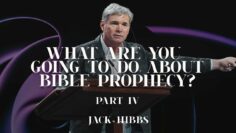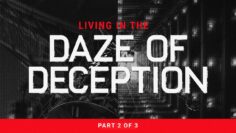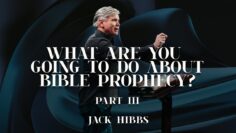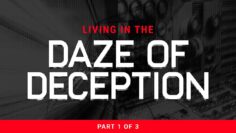
A Quest for the Historical Adam: A Conversation with William Lane Craig
Were Adam and Eve historical? Is belief in an original couple compatible with science? In this interview, I talk with philosopher William Lane Craig about his latest book, “In Quest of the Historical Adam.” We take live questions.
READ: In Quest of the Historical Adam, by William Lane Craig (https://amzn.to/3lRJKAW)
WATCH: Is Adam Historical? A Conversation with Two Leading Scientists: https://www.youtube.com/watch?v=rQ3burs-mUo
*Get a MASTERS IN APOLOGETICS or SCIENCE AND RELIGION at BIOLA (https://bit.ly/3LdNqKf)
*USE Discount Code [SMDCERTDISC] for $100 off the BIOLA APOLOGETICS CERTIFICATE program (https://bit.ly/3AzfPFM)
*See our fully online UNDERGRAD DEGREE in Bible, Theology, and Apologetics: (https://bit.ly/448STKK)
FOLLOW ME ON SOCIAL MEDIA:
Twitter: https://twitter.com/Sean_McDowell
TikTok: @sean_mcdowell
Instagram: https://www.instagram.com/seanmcdowell/
Website: https://seanmcdowell.org
source











I’m sure an honest mistake, but worth noting. At 8:48 Sean says “if Paul is not risen, our faith is in vain.” He should’ve said Christ not Paul.
Most of you in this comment section don't seem able to grasp the arguments and are just making straw man arguments in return. Even if he is wrong, the majority of your arguments don't even address his.
Latter Day Saints understand that these stories were part of ancient temple drama presented in ancient temples to teach in a symbolic way about eternal truths. This kind of lines up with Dr. Craig’s ideas. That is why they are also part of modern temples in the Church of Jesus Christ of Latter Day Saints
But this gentleman doesn't even believe in a 6 days creation!
The kinderlander-mercans/americans would and tend to impute to or add to the word " historical" a significance that it simply will noy bear, given that it ordinary simple meaning is that of histoire- the French word for story- history a sotory(no morebut can include set of beliefs) about the pastor pre-now.
The aothors of genesis- the rabbis or teachers had somhow to address the chicke/egg problemso they hade to come up with some sort of narrative device or deusexmachina, so they dreamed up a mister god that could just magic people out of thin air..
What_else* could they do. If you are looking for a causa causan as opposed to causa sine qua non, it is perfectly resonable to einvent dream up or facy a mister godas some sort of anthropomorphic causa causans.
If you have no idea what is the primary cause of causes use an anology- the father of a family so just I-n-v-e-n-t mister god- why not? You are the teacher or rabbi, who is going to argue with you? It gets silly or fantastic(the stuff of fantasy)*And* be comes *Idolatry when you make your mister god into an image of yourself or a personand suppose you mister god dt to be like you are as the Master puts it of men (human beings/dreaming machines generally, they say tothemselves : "Good … if we are “images of God” . . . that means
. . . means . . . “God” is like us and has an appearance alsolike us … and that means, our “God” has the same moustache, beard, nose, as we have, and he dresses also as we do. He dresses as we do, doubtless because like us he is also very fond of modesty; it was not for nothing that he
expelled Adam and Eve from Paradise, only because they
lost their modesty and began to cover themselves with
clothes.’
“In certain of the beings there, particularly of recent
times, their being-Aimnophnian-mentation or perceptible
logic has already become such that they can very clearly
see this same ‘God’ of theirs in their picturings, almost
with a comb sticking out of his left vest pocket.
Contemporaty loons asl imaginr their mister god to use word- *like them*or that there is something called " the-word-of-god" which is pure anthropomorphic primitive cum savage mumbo jumbo.
How do you get round the chicken egg problem? Invent a narrative device or deus ex mschina and call it god, or miste god it comes to the same thing:Pure anthropomprphic idolatryand you get nto cammandment breaking territory when you attritvbute yo your imsge(mister god-the-prson)*Your_own* characteristics it is kept in your Image_ination and there is no essentisl difference betwwen that Imge and an idol or graven image god-as-a-person is pure undiluted save cumprimitive Idolatry in effectct you reduce god down to be as nssty petty vengeful and judgementaland capricious as you are, in which case you are in deeeeeeeeeeep sh1t, or as -is-said, you are fcuked.
Ask Mr.Craig if he supposes tha there is a democracy of truth aka argumentum ad populum and why the kinderlander suppose that language is a form of magic open only to the grownups, and why he does not shoot from the shoulder and say in terms that the literalist bigots are literalist bigots?
Ask him why the he kinderlander re the only people that suppose that there is magic in the word " historical", or even better why the kinderlander are such suckers for authority.
Sean, I can't find that you have interviewed Dr Hugh Ross on your channel. Might I suggest that you arrange such an interview about his latest book, "Rescuing Inerrancy: a Scientific Defence"? Read yourself first, of course.
Thanks, Keith Wilson, NZ.
Hi Dr. McDowell. Do you agree with Dr. Lane's view point on Genesis 1-11?
1 Timothy 2: 12-15….. Poor apostle Paul….he didn't know about mytho-history….he was taking Genesis literally it's seems… deducing how we should conduct ours selves based on the implications of that 'useful' fairytale….not very useful though seeing we can't even know what they did….was it about eating something prohibited or not cleaning their rooms…. surely it wasn't about eating a forbidden fruit wlc says……wlc has helped the church immeasurably…but has gone off the rails it seems to me…. let's pray he gets back on track….. this does undermine the perception of the scriptures being reliable….this is leaven than can pollute the church…my 2 cents
What about the part where it says God breathed into the dust and made a man?it’s pretty clear it was the first man, right?
Modern science doesn't contradict Biblical creation, though many modern scientists do. The fact that Craig assumes the secular crration myth is true and then interprets the Bible based on that is very problematic.
Just sad to hear a Christian, so-called apologist, scoffing at the biblical account.
"People are going to think I'm compromising Scripture."
That's because you are, sir. The level of cognitive dissonance necessary for this view is too much for me. I don't know if he's being intentionally dishonest with others or just himself.
Sean’s drinking noises are brutalllllllll 😅😅
I'm not doubting anyones salvation here, but I think this is Academics reverting to foolishness! If we can't trust the first 11 chapters of Bible: then in my opinion, we might just as well throw it all out. I believe this is a reason why many are departing from the faith. "For the wisdom of this world is folly with God. For it is written, He catches the wise in their craftiness, "1 Cor 3:19
Began here 40:50
WLG has lost his way with this. I admire his willingness to pick a side. The men in the white coats are not very reliable im afraid so much of this is defunct if you think the many conclusions are more like wishful thinking. WLG has incredible gifts but this isn't one.
Jesus quotes the Bible, giving credibility to the Bible's words. Dr. Craig has a trust issue with Jesus
Regarding Dr. Craig's comment concerning taking the early chapters of Gen. as historical narrative & not metaphor: "if that's what the Bible teaches it puts the Bible at a massive, I think irredeemable conflict with modern science, history & linguistics", I ask the question: Whose science?
Has Dr. Craig ever researched any of the serious science published in Answers Research Journal, or the Proceedings of the International Conference on Creationism? I mention just these two because they are both open access.
Is he aware of the geological research done by the group known as "Is Genesis History?"?
Or the work of Logos Research Associates?
Or the theoretical research done using MENDEL, the numerical simulation program for modeling genetic change over time?
Has he interacted with any of the above?
As for his implicit confidence in the claims of Dennis Venema, has he consulted the papers published by geneticist Jeffrey Tomkins in Answers Research Journal, addressing those claims?
Perhaps he should make a start by reading "Biblical Creation on Solid Ground", Ola Hossjer & Samuel Lampa (eds), 2023.
One kindness demonstrated to us by God through the trial of Covid is that science can be bought, and it is bought, all the time and for decades. In fact its quite cheap, expecially when it's bought with tax-dollars of luke-warm believers. Those who are convinced by "science" to sell their souls pay a high price.
Dr Craig is a Brilliant mind.
Why on earth would the first 11 verses of Genesis be so hard to take literally?
The idea isn’t to focus on “magical fruit” rather the consequences of disobeying God. Also, Gods plan is to literally dwell with us and to walk with us again …..so why is it so hard to believe that this is what God did before our fall. Why are these ideas being described as mythical? I respect Dr Craig’s intellect. But I also think human intellect can become the very rock we stumble over.
Outstanding! I so appreciate Dr. Lane's courageous intellectual probing into these matters. There has always been a sort of cognitive dissonance in my mind as I've wrestled with these very questions.
30:01 "but there was no such person as Hamlet"
False. He's in Saxo Grammaticus' Gesta Danorum.
Shakespear had him from Holinshed. Holinshed's Chronicle.
The assumption "there was no such person as" if not very well born out …
27:47 Jannes and Jambres or Jannes and Mambres … to a Catholic, your comment doesn't make much sense.
Bishop Challoner on II Tim "Jannes and Mambres": The magicians of king Pharao.
Here is a list of comments in Haydock:
Ver. 8. Jannes and Mambres. The names of the magicians, who in Egypt, resisted Moses, says St. Chrysostom, and though not mentioned in the Scriptures, their names might be known by tradition. (Witham)
____________________
Since the Old Testament does not mention these magicians of Pharao, who opposed Moses, it seems probable that St. Paul either learnt their names by a particular revelation, as St. Chrysostom, Theophylactus, and Tirinus think, or by some tradition of the Jews, agreeably to the opinions of Theodoret, Grotius, Estius, &c. Others think he might have found their names in some ancient histories, which have not reached our time; or perhaps from the apocryaphal book of Jannes and Mambres, mentioned by Origen and Ambrosiaster. Certain it is, that in St. Paul's time the names of these two famous magicians were very well known; thus it is by no means necessary in this instance to have recourse to a particular inspiration. The Orientals say there were many magicians who opposed Moses. Among others, they mention Sabous and Gadous, who came from Thebias; Graath and Mospha, from some other country. They wished, as they inform us, to imitate the miracle by which Moses turned his rod into a serpent, by throwing their canes on the ground, and ropes filled with quicksilver. These ropes began to move a little, one twisting with another, on account of the heat of the earth warmed by the sun. But the rod of Moses in a moment broke them to pieces. (Calmet)
_____________________
These magicians are called by different names. The Greek has Jannes and Jambres. Some ancient writers, Jannes and Mambres; as St. Cyprian, Optatus, (chap. 7.) Born. &c. The Jews call that Joanne, or Johanna, whom the Greeks name Jannes; and that called by the Jews Jambres, the Greeks name Mambres. The Hebrews would have them to be the sons of Balaam, the soothsayer, and the masters of Moses in the sciences of the Egyptians. (Calmet)
26:53 If you show NT hagiographers cite Greek mythology, great.
But if you say none of us would want to be committed to it, well, sorry, speak for yourself.
Committing to UIysses having a frequent experience of Athena speaking to him is not committing to Athena springing from the head of "her father Zeus" … it could be a demon, or it could be a guardian angel, or it could be his habitual way of "sensualising" his thought process.
Committing to St. John citing Apollon is not committing to Apollon being a god — more likely a demon from Hell.
There is no theological problem in committing to the historicity of most of Greek mythology.
26:14 "just as Robinson Crusoe"
A few observations.
a) that might be fair game for comparisons, but is not so for explanations
b) the position referred to, not sure you get this, is often held by people who consider the book of Jonah is an edifying fairy-tale and that Moses – not just Noah, but Moses was a myth
c) in the case of Robinson Crusoe, we know as a fact about the composition that it is a novel only partly based on fact, and we know as a fact that the real life model, Alexander Selkirk, lived a somewhat different life, on the island as after rescue — we also refer to this known fact, from time to time; in the absence of such knowledge, and facing centuries of comment without such allusions to fictionality, we have no reason to believe it was fictional.
The guys who made the comment had not thought the issue through.
24:59 "mythological" is not a literary genre. As a Classicist I can say that with one hundred percent confidence.
Myths about gods or heroes interacting with gods (which I would consider as historic legends seen through a pagan lense) come in different genres:
* epics like those of Homer and Hesiod
* tragedy
* comical novels, like The Golden Ass (which is where we find Eros and Psyche).
Each of these is totally open to mundane and non-mythical, the first two mainly factual, content:
* Pharsalia is an epic about the Bellum Civile
* Persai is a tragedy about the Battle of Salamis (or technically about how the Persian king reacts to it)
* Satyricon by Petronius is a comic novel far closer to Asterix and Obelix (especially to their decadent Romans) than to any superhero comics.
So, no, myth is not a literary genre.
22:18 Aesop's fables are examples.
They are literally false, but the principles which they show forth are literally often enough true.
However, no one argues that the proto-history (which has a consecrated use before some bend the phrase to mean mytho-history) is examples. It would wreak havoc with Luke 3.
21:50 Did God speak to Abraham and wrestle with Jacob?
If yes, you have admitted God even before the Incarnation was capable of Theophanies that are reminiscent of the Incarnation.
And if so, you have no business deriding "an anthropomorphical God" — Who arguably was the first person Adam talked with (I suppose it was God the Son).
And if you believe Balaam's donkey was literally prompted to utter speech by a kind of guardian angel, what is your beef with the Talking Snake, especially as Apocalypse tells us who was prompting the speech through those cleft tongue and fangs?
The only remaining piece of ridicule would be trees the fruit of which grant, but have you ever considered the Catholic view of the Sacraments?
20:52 "Wasn't taken literalistically, even by those who accepted the myth as authoritative for their culture"
There are examples of this in Greco-Roman myth, but this is because of a culture shift in which Epicurean and Stoic philosophy had undermined belief in even the possibility of such things with a great many (note, Christian authors are more prone than Livy and Plutarch to take "myths" from before the Trojan war literally than they were, not less).
Considering the take of Plutarch on Theseus as the original view is a bit like pretending Dean Inge's view of the Gospels was the original Christian one. William Ralph Inge. You don't take John Robinson as an early Christian exponent of Christian orthodoxy:
// Honest to God is a book written by the Anglican Bishop of Woolwich John A.T. Robinson, criticising traditional Christian theology. //
20:41 Fantastic content does not equal figurative language.
I disagree with your overall assessment of myth, including pagan myth.
I don't know what it was that infested the Lernaean swamp before Hercules went there, but one clear option is, a demonic entity or seven demonic entities were showing an apparition of quasibiological monsters, and when Hercules, a son of a cursed pregnancy, a man on whom Satan had a claim, came there, they made an agreement.
Just so it should not even appear that Beelzebub was driving out Satan, Hercules admitted there was a still living and immortal head of hydra still around, though he had buried it.
Btw, while that hydra might not literally reappear in the end times, it could very well be the same demons that are involved in the seven heads of the Apocalypse 13 monster. Note, there I do favour a figurative language, but that is because apocalyptic literature is coded. We can't literally say it is this or this guy without any reserve before he shows off the evils of Antichrist (I have four people with a gematria of 666 on a "watch list" — it has wavered between 4 and 3 the last decade : Sebastian Kurz out, Biden in, "Papa Bento" / "Πάπας Βενέδικτος ΙΣΤ΄" out, Charles III in, as being no longer a Welshman, technically, but at once an "ENGELSMAN" and a "skotte" in Swedish. Putin was the earliest guy on the list and is still around). Just as coding a person name as a gematria applicable to several names, coding seven princes or kings and the names of their kingdoms into figurative beasts also helps to maintain the secret until it's too late for those involved to step back.
But Hercules is not apocalyptic. There is no reason to take either his close friendship with Iolaus or his bad relation to the wives or his ridding the landscape of monsters figuratively — unless you are bound up with an ideology which says such things cannot have literal existence (the two last works of the twelve are not figurative but literally his bragging of things he didn't know about).
19:55 Thank you!
19:33 I certainly agree on being straight forward and defining terms.
But then laity may choose between Thorkild Jacobssen and George Leo Haydock.
I chose the Catholic Church and in doing so chose Haydock. It was never my ultimate intention to chose Theilhard de Chardin.
18:32 Gordon Wenham, got you. John Collins, which of the following (except probably the first)?
John Collins (Independent minister) (c. 1632–1687), English Independent minister
John J. Collins (bishop) (1856–1934), American-born Catholic bishop in Jamaica
John Collins (priest) (1905–1982), radical Anglican canon at St Paul's Cathedral
John A. Collins (chaplain) (1931–2003), Chief of Chaplains of the U.S. Air Force
John Collins (nuncio) (1889–1961), Irish bishop and diplomat in Liberia
John T. C. B. Collins (1925–2022), Anglican priest and leading figure in the charismatic movement
perhaps:
ah, yes, very probably:
John J. Collins (born 1946), Irish biblical studies scholar
18:20 I think the reason that Genesis 1 to 11 sticks out is, most of it (except chapter 1, which was given in a vision to Moses) was transmitted orally, which, for accuracy, means you need to either add a mnemotechnic (like verse) or renounce being prolix.
I think the reason it has a resemblance to etiological myths is that God did root some permanent realities in the history of these chapters, c. 3/7 of the timeline from creation to ourselves.
And I think the reason it has a resemblance to history is, it is history.
18:01 I am already in horror for what's next, when I hear you are referring to Thorkild Jacobssen. Because he is a great Assyriologist.
I recall what a butchery of Orthodoxy Rev. Rudolph Bandas in 1943 did based on believing the Assyriologist Archibald Sayce.
16:43 You conflate "myth" as traditional (usually sacred) narrative with "etiological myth" which is a subsection, and you forget that in any relevant sense, millions and billions of years are more likely to be an etioloogical "myth" in this sense (an attempt by the author, not something he simply took over) than Genesis.
16:21 "we are talking about myth in the sense that Folklorists or Classicists use that term"
As a classicist myself, I am not impressed. I studied examination wise counting four terms of Latin, and in fact longer, and as for Greek it was two and a half terms.
The historic or otherwise status of fall of Troy or Hercules is not a basics we agree on, like we agree on the kappa-aorist being rarer than the sigma-aorist or on Latin perfect tense reflecting both Greek perfect and many uses of Greek aorist.
It's a matter of debate, and while Bill T. Arnold may not be aware of it, dis-qualifying the factuality of such stories as are commonly termed myths is not the default position of a classicist – including of a Christian Classicist.
Lately, Classicists have tended to deny even the fall of Troy. This I could find out by going to videos by Cinzia DuBois, one of which was about the Trojan War. In her faculty teaching her classics, the Trojan War is about as historical as the Marvel Franchise Asgard. Even 20, 30 years earlier, when I was taught in Lund, this was not the case. I suspect this is due to a cultural comeback for Communism in the years after 1990, while I was breathing an atmosphere of Cold War anticommunism on some levels.
If we go back even further, Walter Leaf analysed the Iliad as containing one made up character, Hector, and one made up story, about Achilles' relations to Patroclus and Hector, to unify a by and large, though not totally historic material into one story-line. He dismisses the Greek ship catalogue as ahistoric because it contains ships from Corinth, which didn't exist in Mycenaean days, one possibility could be this being a blunder or deliberate addition on Homer's part, and another one it could refer to Sicyon, not very far from Corinth. How old is Sicyon? George Syncellus considers the kings of Sicyon began around the time of Abraham.
"In Mycenean times, according to Eusebius, Sicyon had been ruled by a line of twenty-six mythical kings and then seven priests of Apollo. The king-list given by Pausanias[2] comprises twenty-four kings, beginning with the autochthonous Aegialeus. The penultimate king of the list, Agamemnon, compels the submission of Sicyon to Mycenae; after him comes the Dorian usurper Phalces. Pausanias shares his source with Castor of Rhodes, who used the king-list in compiling tables of history; the common source was convincingly identified by Felix Jacoby[3] as a lost Sicyonica by the late 4th-century poet Menaechmus of Sicyon."
I highly doubt that Eusebius in Ecclesiastic history actually called the line of twenty-six kings mythical … I know for a fact that St. Augustine in City of God uses the historical account of Virgil as proof for the gods of Troy being very bad debtors.
15:12 – 15:40 "Genesis 1 to 11 is acknowledged by every New Testament (!) Commentator to be apart from the rest, to be a special sort of narrative, and a peculiar genre of literature, and the classification of this genre as mytho-history was suggested to me by the Old Testament scholar …
Bill Dernold? Bill Arnold? Bill Bernard? Bill T. Arnold!
… who teaches at Asbury."
There is no such a genre as mytho-history.
Not traditionally. Bill T. Arnold did not get it from a good knowledge of literary genres, but of his own prejudice against the straightforward classification as straightforward history.
But factuality or not of the subject matter does not constitute a genre.
The parts of Greek history that are often considered as mythology are not so, originally, for their relation to historic events, but simply for the fact that the time period in question (essentially before, up to, and very closely after fall of Troy) as rich in stories and those stories being related to the gods and their actions.
Now, there is no doubt that the stories were taken over from an earlier culture in which ascribing things to the action of gods was more fashionable, but precisely for that reason, this does not preclude these stories from reflecting real events.
Furthermore, there is a cultural break, of which the Greeks were conscious, and yes, the Classic Greeks were not fully knowledgeable about Mycenaean and early post-Mycenaean Greece, but while this is a good parallel to Genesis 1 to 11 if they are real history from for instance a post-Flood stone age in the days of Noah and Babel, what is now dated 20 000 or 10 000 before the present, it would be a very bad parallel to Genesis 1 to 11 if they were thought to be made up myths, or made up myths losely based on and radically remodelling history, and redacted first time over in the times of Moses or of Ezra.
15:12 "from the call of Abraham in chapter 12 on, you have straightforward history"
If you refuse a YEC tweaking of carbon dates, you actually make this impossible.
Genesis 14 has an event which is dated to 3500 BC by archaeology. While it doesn't say the Amorrhaeans left Asason Tamar, neither does it deny it, and there is no later point at which they could have been attacked in Asason Tamar than the time when they left it.
Asason Tamar is En Geddi.
II Chron. 20:2
And there came messengers, and told Josaphat, saying: There cometh a great multitude against thee from beyond the sea, and out of Syria, and behold they are in Asasonthamar, which is Engaddi.
And En Geddi was empty between the evacuation of the chalcolithic settlement, thought to be Amorrhaeans, in "3500 BC" and the Iron age, which is after Abraham's time.
Now, you can't help this by putting Abraham earlier than usually thought either, not by c. 1.5 millennia, since this poses inextricable problems in other ways. Abraham's calling was 430 years before the Exodus. Putting Genesis 14 (1 – 11 years after the calling, Abraham had been in Egypt and not yet become father of Ishmael) in 3500 BC makes the Exodus happen in 3075 BC. Which is obvious nonsense.
Now this I say, that the testament which was confirmed by God, the law which was made after four hundred and thirty years, doth not disannul, to make the promise of no effect.
[Galatians 3:17]
So, the law on Sinai, therefore the Exodus event, happened 430 years after the promise.
12:13 "how would they have been understood by the author and audience at the time when they were written?"
This is a false criterium. Why so? Because :
a) it's not the criterium of the Catholic Church;
b) it's dangerous for the end times, as it involves the impossibility of new technology to be relevant for either what the mark of the beast is or how the number of the beast is calculated …;
c) and it's not verifiable. We have the text from back then. We do not have another text from back then telling us the understanding of the first text back then, usually.